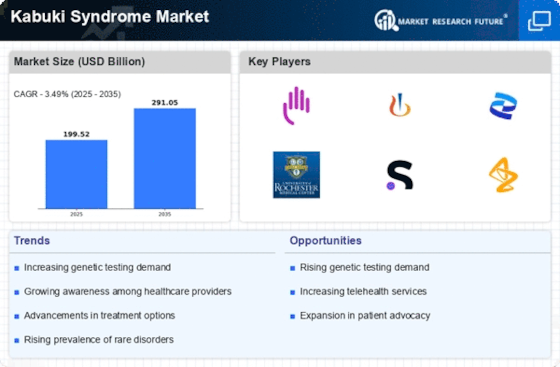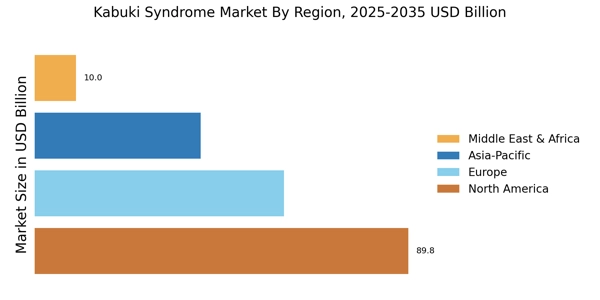Advancements in Genetic Testing
Advancements in genetic testing technologies are significantly influencing the Kabuki Syndrome Market. The development of next-generation sequencing and other innovative diagnostic tools has made it easier to identify genetic mutations associated with Kabuki Syndrome Market. This has led to earlier diagnosis and intervention, which is crucial for improving patient outcomes. As testing becomes more accessible and affordable, it is anticipated that more patients will be screened for this condition. Consequently, the Kabuki Syndrome Market is likely to experience growth as healthcare providers seek to offer comprehensive care plans that include genetic counseling and personalized treatment options. The integration of genetic testing into routine clinical practice may also foster a better understanding of the disorder, further driving market expansion.
Development of Targeted Therapies
The development of targeted therapies for Kabuki Syndrome Market is emerging as a key driver in the Kabuki Syndrome Market. Researchers are exploring various treatment modalities that specifically address the underlying genetic causes of the disorder. This focus on precision medicine is expected to yield more effective treatment options, which could significantly improve the quality of life for patients. As clinical trials progress and new therapies are validated, the Kabuki Syndrome Market may witness a surge in interest from pharmaceutical companies looking to invest in this niche area. Additionally, the potential for targeted therapies to address specific symptoms associated with Kabuki Syndrome Market may lead to a more personalized approach to patient care, further enhancing the overall market landscape.
Rising Incidence of Kabuki Syndrome
The increasing incidence of Kabuki Syndrome Market is a notable driver in the Kabuki Syndrome Market. Recent estimates suggest that the prevalence of this genetic disorder may be higher than previously understood, with some studies indicating that it affects approximately 1 in 32,000 live births. This rise in reported cases is likely due to enhanced diagnostic capabilities and greater awareness among healthcare professionals. As more individuals are diagnosed, the demand for specialized treatments and interventions is expected to grow, thereby expanding the Kabuki Syndrome Market. Furthermore, the need for tailored therapies and support services for affected families is becoming increasingly apparent, which may lead to further investment in research and development within this sector.
Increased Funding for Rare Disease Research
Increased funding for rare disease research is a pivotal factor propelling the Kabuki Syndrome Market. Governments and private organizations are recognizing the importance of investing in research for rare genetic disorders, including Kabuki Syndrome Market. This funding is essential for advancing scientific understanding, developing new therapies, and improving patient care. For instance, initiatives aimed at fostering collaboration between researchers and pharmaceutical companies are becoming more common, which may lead to innovative treatment solutions. As research progresses, it is expected that new therapeutic options will emerge, thereby enhancing the Kabuki Syndrome Market. The growing emphasis on rare disease research not only benefits patients but also encourages the development of specialized healthcare services tailored to their unique needs.
Rising Awareness Among Healthcare Professionals
Rising awareness among healthcare professionals regarding Kabuki Syndrome Market is contributing to the growth of the Kabuki Syndrome Market. As medical education evolves, more practitioners are being trained to recognize the signs and symptoms of this condition. This increased awareness is crucial for timely diagnosis and intervention, which can significantly improve patient outcomes. Furthermore, healthcare providers are increasingly participating in continuing education programs focused on genetic disorders, thereby enhancing their ability to manage cases of Kabuki Syndrome Market effectively. As a result, the demand for specialized care and resources is likely to rise, further stimulating the Kabuki Syndrome Market. This trend may also lead to the establishment of multidisciplinary teams that can provide comprehensive care for affected individuals.

















